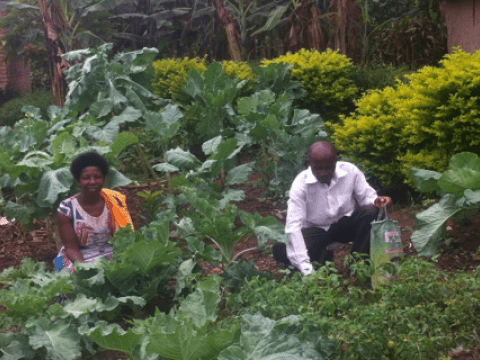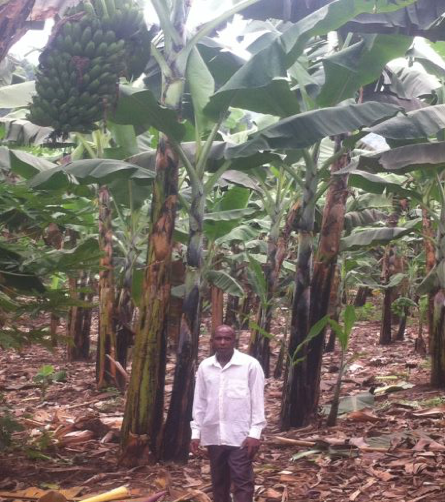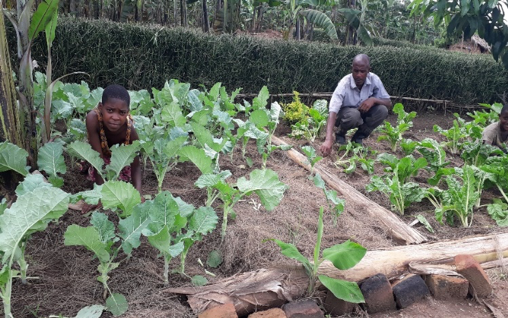Elinest’s “Garden of Eden”


Forty-nine-year-old Elinest is a resident of Kyalulangira sub-county in Rakai District in western Uganda. He is a father of eight, and one of his children is registered under World Vision's child sponsorship programme.
We recently visited his community to check on the progress he and his household cluster members are making to transform the lives of their children and families. And behold! Among all households visited, Elinest’s stood out. The organisation of the homestead is excellent. Everything from the kitchen to the plate stand, toilet and tippy-tap are in place, and at a recommended distance from each other. The level of cleanness, quality of hedges, and freshness from the air are superb. And the flourishing gardens of different crops point to one thing: life in all its fullness.
Elinest is a member of Tukolerehamwe Household Cluster that was created with the support of World Vision to empower households to be in charge of their own development agenda. The community-focused approach dubbed the Household Empowerment and Accountability Approach is a World Vision Uganda innovation that brings together 10 to 20 households in densely-populated communities and five to 10 in sparsely populated communities.
The approach equips and strengthens families and caregivers to be the first line of protection and care for children. It also promotes different aspects of child well-being, including health, education, livelihoods, and child protection at the household level.
Moses Kadobera Leneker, Community Engagement and Mobilisation Manager at World Vision in Uganda is responsible for the successful scaling up of this approach across all districts where World Vision has operations. So far a total of 12,461 household clusters have been formed and active since the launch of the approach in 2017. “This approach has been adopted in all communities where we work because it puts households in the driving seat of their own development agenda,” says Moses. “It empowers individuals and families to discover their value as created in the image of God and use resources within and around them, to become active agents of their own change.”
As a matter of fact, increased and sustained well-being for children –especially the most vulnerable– is what you witness when you are at Elinest’s household. The deep green canopies of bananas, vegetables, herbs, and fruits are what welcome you. As you stand still in awe of the kitchen gardens and orchard patches around the homestead, you are awakened to noises of a chicken's cackle, cock's crow, goat's bleat, and cow's moo. Anyone would easily describe Elinest's home a real replica of the Garden of Eden, as everything seems present and well-managed with a family house in the centre.
Before joining the household cluster, my life was disorganised and my household in a total mess,” says Elinest. “Everything started changing for better in 2017 when I became a member of a household cluster as promoted by World Vision. Honestly, I am what I am because someone cared and believed it was possible to change my own situation.
After receiving the training in best farming practices and methods under the household cluster, Elinest started putting into practice what he had learnt. In the first year, he increased his yield four-fold. For Elinest, this was a dream realised too soon. “Honestly, before I was working really hard, but I was not realising anything worth the sweat,” he says, adding: “I was losing hope and almost on the verge of giving up.”
For the last two years, Elinest has been harvesting more than 100 bunches of banana every month as opposed to only 30 bunches before. Inevitably, this increased his income from US$81 to US$270 per month.
Besides practicing improved farming, Elinest like the rest of his household cluster members is keeping animals and poultry. He is also a member of a savings group. Getting involved in all these activities has empowered Elinest to ensure his children thrive; their futures filled with hope, well-being and promise.
“I now have the capacity to save, borrow, and invest further to grow my income; a thing that was not possible before,” he says proudly.

From being a disorganised small-scale farmer to the successful one he is now, Elinest attributes all this transformation to World Vision’s staff who in his own words are “inspiring, courageous and loving”.
You [World Vision staff] shine light into places of need. You give energy and purpose to good intentions, and invite others to take part in life-changing endeavours.
According to Elinest, he is a living example of World Vision’s care with compassion and humility, and speaking truth. “Before we didn’t know how to use resources around us and within us to change our lives,” he confesses. “But you people persisted even through hardship, and continuously challenged yourselves and others to do their best.”
Through household clusters, Elinest says that he and his community members are now better organised to engage, demand for quality service delivery, and keep their leaders accountable. The other benefit of belonging to a household cluster, he says, is that members get to learn from and influence each other, including the adoption of good sanitation and hygiene practices, improved farming as well as how to prepare nutritious foods for their children.
In addition, cluster members are accountable to each other; a thing that has significantly improved relationships among neighbours, improved health-seeking behaviour and created a safe environment for all children.
With increased harvests and income, Elinest has got enough food and economic muscle to meet all the needs of his eight children. And his wife Dina can’t agree anymore: “The curse of poverty has been dealt a death blow in our household. We are overjoyed to have had the opportunity with World Vision, a real true friend. Our life has been impacted beyond than we imagined,” she concludes.
---
Story by Henry Mugisha, Resilience and Livelihood Technical Programme Officer, World Vision in Uganda